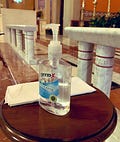This tweet brought to mind something that really bothered me when the bishops took "covid measures" with all the confidence of a bevy of public health experts and microbiologists combined, and introduced a "rite of sanitizing" (yes, it was a rubric) during Mass (when they allowed Mass) — though that episode has also proved revealing about their overall concept of what their duty towards protecting worship, supposedly their actual area of expertise, really is.
For about fourteen hundred years, no one thought it wise to change liturgical gestures or remove or add to them. If something was introduced, it had to be scrutinized for its fittingness and dignity. But hardly anything ever was. That’s just a fact, readily confirmed by looking at ancient depictions of liturgical actions and comparing them to those of today — in the traditional rites.
The altar in particular had certain things placed on it and everything else forbidden.
In the General Rubrics of the Roman Missal for the Traditional Latin Mass it’s clear:
529. Nothing whatsoever is to be put on the altar which does not pertain to the sacrifice of the Mass or to the adornment of the altar itself. [e.g. candles, specified as to number]
The current GIRM for the Novus Ordo is similar, though it unwisely allows for microphones “discreetly” placed there.
You can see how easy it would be to accumulate a lot of things not pertaining to or worthy of the sacrifice of the Mass, just as on your kitchen table: artificial flowers, reading glasses, a plastic bottle of water for maximum hydration, pamphlets about things to be read at the homily, scraps of paper reminding who the Mass is being offered for, and, yes, bottles of sanitizer.
There were times during lockdown when there was a bottle of sanitizer *on the altar*.
I said to a friendly priest, "don't put the sanitizer on the altar!"
He said "why not?"
— and then answered himself: "Because it's not sacred."
RIGHT.
Tampering with the rite in the Vatican II era (before and after) has revealed the exact process of how truly profane things become embedded and almost impossible to dislodge.
I call it the tyranny of bright ideas.
By the way, sanitizer does nothing to kill viruses unless you rub it in your hands for 20 seconds, and only strips away your natural good bacteria, harming your immune system.
If the priest is not sick and washes his hands before Mass, then there is nothing to contaminate the Host he offers to the faithful. This includes offering communion on the tongue, which anyone can attest can easily take place with no contact (much more easily than when done in the hand).
The danger of spreading illness comes from the germy practice of using “Eucharistic ministers” who are coming from all over, often straight from the pews.
Anyway, that’s beside the main point, which is that having been deprived of Tradition, where anything introduced to the rite must be tried in the fire of vigilant authority, we have sloppy lower-case t tradition, radiating its own "truth" — which right now is that bodily health is a higher good than fitting worship to God.
As I replied to that exasperated tweet that called for the removal of those odious bottles:
Oh no, heaven forfend! It’s traditional! Part of the rite! HOW DARE YOU





Man cannot be without tradition. Should true Tradition and authentic devotion be eschewed, something spurious would replace it, like the tradition of hand sanitizers, floor stickers and TSA-style check-in counters.
> I call it the tyranny of bright ideas.
There's way too much of that in the world!
And I like your takedown of hand sanitizer. At my parish, they would make you stick out your hand and receive a pump-spray of sanitizer before entering the main worship hall for Mass. I would receive the sanitizer in my palm and then proceed directly downstairs to the restroom to wash it off my one hand that had been contaminated with such a fake "safety" product.